Suivi et évaluation
La plupart des défis liés au suivi et à l’évaluation, comme la quantité insuffisante d’investissements et le manque de capacités, ne sont pas spécifiques à l’assistance monétaire, mais ceux qui le sont concernent principalement le suivi des résultats des transferts non affectés. La flexibilité des transferts monétaires peut compliquer la définition d’indicateurs de résultats appropriés, qui pourraient impliquer un mélange d’indicateurs spécifiques au secteur et transversaux. En parallèle, il existe des limitations au moment de collecter des données précises sur la manière dont les transferts monétaires sont dépensés.
Les signataires du Grand Bargain se sont engagés à garantir que des mécanismes de suivi et d’évaluation pertinents des transferts monétaires soient en place, et à assurer une meilleure compréhension des coûts, avantages, impacts et risques de cette modalité par rapport à d’autres. En partant de cet engagement, le chantier du Grand Bargain sur les transferts monétaires a établi plusieurs points d’action, dont le développement d’indicateurs de résultats communs pour les transferts monétaires à usages multiples, et des indicateurs pour l’analyse de l’optimisation des ressources. L’analyse systématique de l’optimisation des ressources a été rendue difficile par plusieurs facteurs, dont un manque d’approches approuvées, le besoin en données sur les résultats en termes de qualité et le caractère intensif de l’analyse.
Priorités actuelles
Dans le cadre des engagements du chantier du Grand Bargain sur les transferts monétaires, le CALP Network a co-dirigé (avec l’USAID et CRS) la mise au point d’indicateurs de résultats des transferts monétaires à usages multiples. Le projet à tester est actuellement disponible en anglais, espagnol et français, via la bibliothèque.
Initiatives associées
Contenu présenté

Indicateurs de résultats des transferts monétaires à usages multiples : Projet final à tester
Guides et outils
Les indicateurs présentés dans ce document se concentrent sur les principaux objectifs des TMUM humanitaires et sur les résultats auxquels les transferts monétaires à usages multiples peuvent le plus fortement contribuer. (Par exemple, certaines interventions en TMUM visent à relier les personnes aux systèmes de protection sociale après la fin du TMUM; mais nous n’avons pas inclus...

Monitoring 4 CTP: Monitoring Guidance for CTP in Emergencies
Guidelines and Tools
This guidance provides a central resource to promote a common understanding of the most important monitoring considerations for humanitarian projects using cash transfer programming (CTP). The primary audience for this guidance is field-level practitioners, from organisations directly involved in the design, implementation, monitoring, and accountability of projects using cash and vouchers...

Cost-Efficiency Analysis of Basic Needs Programs: Best Practice Guidance for Humanitarian Agencies
Guidelines and Tools
The Efficiency, Effectiveness and Value for Money Sub-Workstream is pleased to share the final output on Cost-Efficiency Analysis of Basic Needs Programs: Best Practice Guidance for Humanitarian Agencies (attached).
Cost-efficiency analysis estimates the ratio of program costs to outputs created, allowing you to compare cost-per-output for programs which all produced the same output. Such...
Thematic lead
Contenu récent
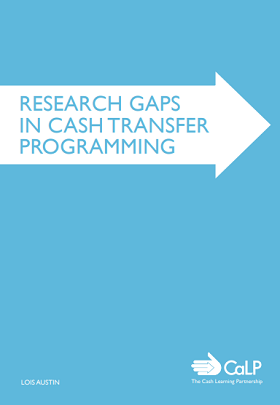
Research gaps in cash transfer programming
Report
Gathering evidence through action research is one of the ways that the CALP Network aims to improve cash transfer programming (CTP) implementation and raise awareness about CTP and its use as an appropriate and effective mechanism for emergency response. Before defining potential research topics for 2014,...

Lesotho Child Grants Programme – The historic and future costs of the CGP and its affordability
Report
The purpose of this costing study is to review the historical costs of the Child Grants Programme (CGP) between October 2007 and December 2012, simulate the likely future cost of the programme, and assess the programme’s affordability under the current fiscal environment. This report presents the...
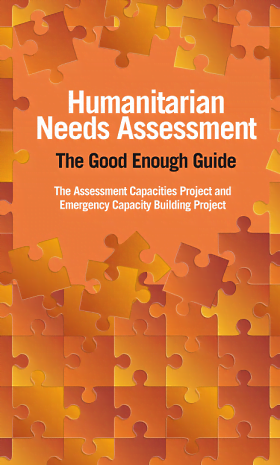
Humanitarian Needs Assessment – The Good Enough Guide
Report
Needs assessment is essential for programme planning, monitoring and evaluation, and accountability, however needs assessment is still a critical weakness of humanitarian response. Organizations urgently need to improve how they do assessments. The humanitarian community has been working on this issue...
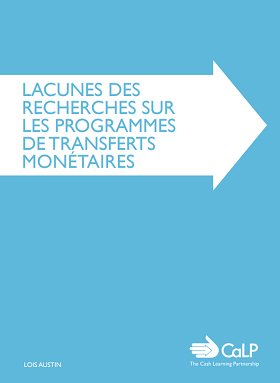
Lacunes des recherches sur les programmes de transferts monétaires
Rapport
En rassemblant des résultats grâce à la recherche-action, le CALP Network a pour objectif d’améliorer la mise en oeuvre des programmes de transfert monétaire (PTM) et de sensibiliser l’opinion sur les PTM en tant que mécanisme approprié et efficace pour les interventions d’urgence. En...
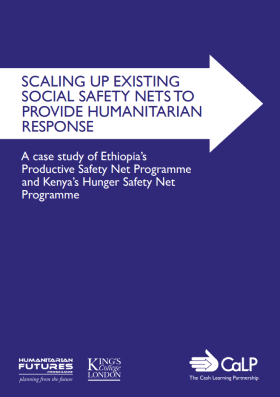
Scaling Up Existing Social Safety Nets to Provide Humanitarian Response: A case study of Ethiopia’s Productive Safety Net Programme and Kenya’s Hunger Safety Net Programme
Policy paper
A case study of Ethiopia’s Productive Safety Net Programme and Kenya’s Hunger Safety Net Programme. This thematic report has been undertaken as part of a 2013 research study entitled, Is Cash Transfer Programming ‘Fit for the Future’? The research was commissioned by the the CALP Network and...
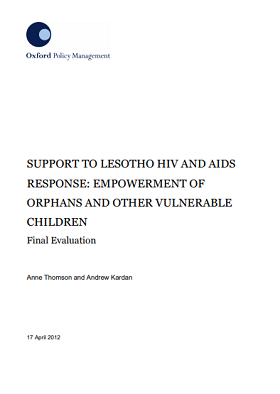
Support to Lesotho HIV and AIDs Response: Empowerment of Orphans and Other Vulnerable Children
Report
Oxford Policy Management (OPM) has been contracted by UNICEF Lesotho to undertake the final evaluation of the Project “Support to Lesotho HIV and AIDS Response: Empowerment of Orphans and Vulnerable Children”. The main objective of this evaluation is to provide decision makers in the Government of...

Payment Mechanisms and Anti-Poverty Programs: Evidence from a Mobile Money Cash Transfer Experiment in Niger
Report
Cash transfers have become an increasingly important component of social protection policies in both developed and developing countries. While such programs are often implemented electronically in developed countries, in many developing countries with weak financial infrastructure, such transfers are...
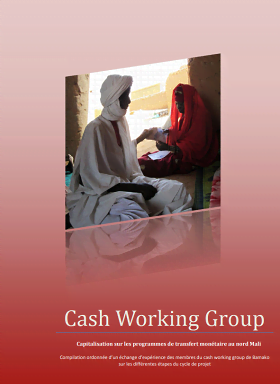
Capitalisation sur les programmes de transfert monétaire au Nord Mali par les membres du Cash Working Group
Rapport
Appuyé par le CALP Network, le groupe de travail sur les transferts monétaire au Mali, mené par Oxfam, se réunit régulièrement pour partager des expériences de terrain sur les réalisations de programmes de transfert monétaire. Ce document a ainsi été réalisé dans ce but. Il ne s’agit en...
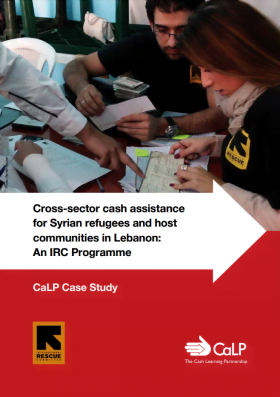
Cross-Sector Cash Assistance for Syrian Refugees and Host Communities in Lebanon: An IRC Programme
Report
Since January 2013, the International Rescue Committee (IRC) has been implementing a project providing humanitarian assistance to the Syrian refugees in Lebanon. This project provided unconditional financial assistance to targeted Syrian refugees and Lebanese host households to help them be better...

Humanitarianism in the Age of Cyber-warfare: Towards the Principled and Secure Use of Information in Humanitarian Emergencies
Report
Humanitarian assistance is driven by information. From early warnings to needs assessments to final evaluations, information determines priorities and resource allocation. In addition, a crisis drives people to collect and share personal information that they otherwise wouldn’t: the names of missing...
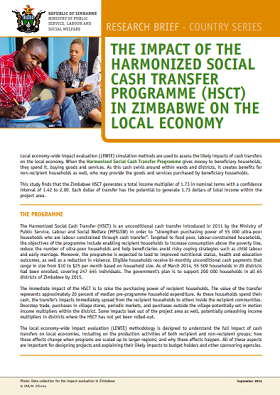
The Impact of the Harmonized Social Cash Transfer Programme (HSCT) in Zimbabwe on the Local Economy
Report
Local economy-wide impact evaluation (LEWIE) simulation methods are used to assess the likely impacts of cash transfers on the local economy. When the Harmonized Social Cash Transfer Programme gives money to beneficiary households, they spend it, buying goods and services. As this cash swirls around...
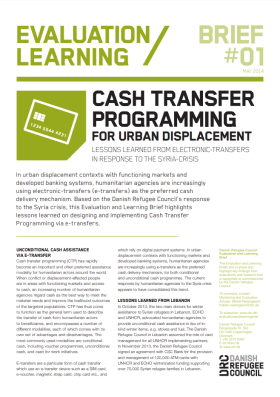
Cash Transfer Programming for Urban Displacement
Policy paper
In urban displacement contexts with functioning markets and developed banking systems, humanitarian agencies are increasingly using electronic-transfers (e-transfers) as the preferred cash delivery mechanism. Based on the Danish Refugee Council’s response to the Syria crisis, this Evaluation and...

Insufficient Evidence? The Quality and Use of Evidence in Humanitarian Action
Report
This paper (and the ALNAP meeting on which it is based) is underpinned by the sense that ‘at present, humanitarian decisions are often based on poor information’ (DFID, 2012: 5) and are ‘anecdote, rather than evidence, driven’ (Mazurana et al., 2011: 1). Even when evidence is available, decisions...
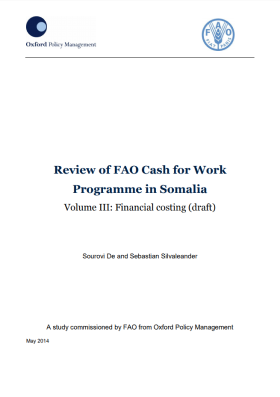
Review of FAO Cash for Work Programme in Somalia
Report
The objective of this costing study is to understand the absolute and relative magnitudes of various drivers of programme costs and to assess the cost-efficiency of the CFW Programme’s operations, using the total cost-to-transfer ratio (TCTR) for the programme which represents the total cost incurred by...

Rapport sur l’atelier de capitalisation sur Les Programmes de Transferts Monétaires au Mali
Rapport
En 2014, plusieurs acteurs souhaitent mettre en oeuvre des PTM comme un moyen d’assistance des populations vulnérables et ainsi, promouvoir le redressement de leurs moyens de subsistance (par exemple, l’initiative « Cadre commun filets sociaux Nord Mali » sous financement ECHO). Cependant, la...

Étude de programme de transfert monétairs dans la Région Sahel
Rapport
La Welthungerhilfe, ayant déjà une expérience considérable dans la mise en ouvre de programmes d’« Argent contre Travail », a lancé depuis l’année 2011, ses premiers programmes dans la région du Sahel de « transferts monétaires inconditionnels » et transfert à travers « Coupons...

Unconditional Cash Assistance via E-Transfer: Implementation lessons learned – Winterization support via CSC bank ATM card
Report
This document looks at the lessons learned from the Danish Refugee Council’s e-transfer programme designed to provide cash assistance to Syrian refugees in Lebanon using the CALP Network’s guidelines on e-transfers in emergencies as a point of reference for assessing adherence to best practices.
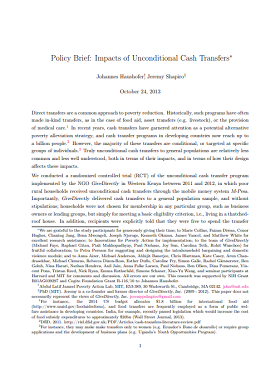
Policy Brief: Impacts of Unconditional Cash Transfers
Policy paper
This policy paper looks at a randomized controlled trial (RCT) of the unconditional cash transfer program implemented by the NGO GiveDirectly in Western Kenya between 2011 and 2012, in which poor rural households received unconditional cash transfers through the mobile money system M-Pesa. Importantly,...

Étude de cas : préparation de la mise en oeuvre à grande échelle des programmes de transferts monétaires dans les situations d’urgence
Case Study
La Fédération internationale des Sociétés de la Croix-Rouge et du Croissant-Rouge (Fédération internationale) a collaboré, entre mai 2012 et décembre 2013, avec les Sociétés nationales de quatre pays pilotes – Croix-Rouge philippine, Croix-Rouge du Viet Nam, Croix-Rouge sénégalaise et...
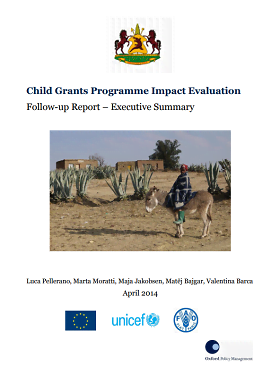
Child Grants Programme Impact Evaluation Follow-up Report – Executive Summary
Case Study
The Lesotho Child Grants Programme (CGP) is an unconditional social cash transfer targeted to poor and vulnerable households. It provides every quarter a regular transfer of between M360 and M7501 to poor households with children that are selected through a combination of Proxy Means Testing (PMT) and...
